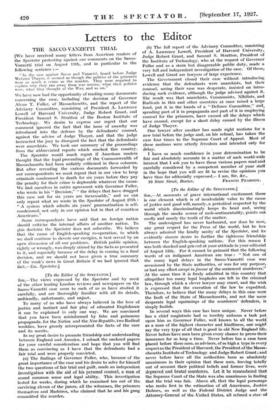Letters to the Editor
THE SACCO-VANZETTI TRIAL
[Wn have received many letters from American readers of the Spectator protesting against our comments on the Sacco- Vanzetti trial on August 13th, and in particular to the following sentence :— "In the case against Sacco and Vanzetti, heard before Judge Webster Thayer, it seemed as though the politics of the prisoners were as much a crime as the murder. They were required to explain why they ran away from war service, what their politics were, what they thought of the War, and so on."
We have now had the opportunity of reading many documents concerning the case, including the decision of Governor Alvan T. Fuller, of Massachusetts, and the report of the Advisory Committee, consisting of President A. Lawrence Lowell of Harvard University, Judge Robert Grant, and President Samuel S. Stratton of the Boston Institute of Technology. We desire to express our regret that our comment ignored the fact that the issue of anarchy was introduced into the defence by the defendants' counsel, against the advice of Judge Thayer, and that the judge instructed the jury to disregard the fact that the defendants were anarchists. We took our summary of the proceedings from the abbreviated reports which reached this country.
• The Spectator would much regret if American readers thought that the legal proceedings of the Commonwealth of Massachusetts had been unfairly criticized in these columns. But after rereading the various documents forwarded by our correspondents we must repeat that in our view to keep criminals condemned to death for six years before they pay the penalty for their crime is deplorable whatever the cause. We find ourselves in entire agreement with Governor Fuller, who wrote in his "Decision," "the delays that have dragged this case out for six years are inexcusable," and we can only repeat what .we wrote in the Spectator of August 27th: "A system which admits six years' procrastination is self- condemned, not only in our opinion but in that of countless Americans."
Some correspondents have said that no foreign nation should criticize the internal affairs of another nation. To this doctrine the Spectator does not subscribe. We believe that the cause of English-speaking co-operation, to which we shall continue to devote our energies, is best served by an open discussion of all our problems. British public opinion, rightly or wrongly, was deeply stirred by the facts as presented to it, and especially because of the delay in coming to a final decision, and we should not have given a true summary of the week's news in Great Britain if we had ignored that fact.—En. Spectator.]














































 Previous page
Previous page